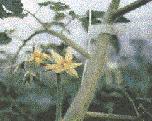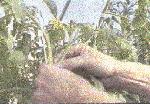When the tomato plants are set out in the greenhouse, they will need to
be supported. The type of support system used varies from grower to
grower but most are some variation of the following. Main support wires
are strung above the plant rows. From the main wires a string is hung
down to each plant and then the plant is clipped to it. The tomato plants
can grow as much as one foot per week so the clipping process needs to
be done every week.

Plant clip and support
string on a tomato plant

